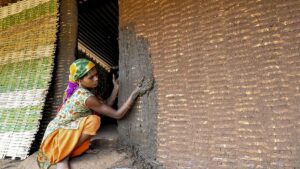GS3 – Science & Technology

Context:
Gujarat has launched India’s first Tribal Genome Sequencing Project, aiming to map the genetic landscape of tribal communities across 17 districts.
Project Objectives:
- Precision Medicine: Identify genetic predispositions to illnesses such as sickle cell anaemia, thalassaemia, and hereditary cancers for targeted interventions.
- Genetic Profiling: Understand inherent traits linked to physical endurance and sports capabilities.
- Scientific Infrastructure: Establish cutting-edge facilities for genetic data collection, sequencing, and interpretation.
- National Relevance: Enhance the Genome India Project by addressing the current underrepresentation of tribal populations.
Scientific Approach:
- Sample Size: Whole Genome Sequencing (WGS) will be conducted on 2,000 genetically diverse individuals.
- Sample Composition: Includes trio samples (individual and both biological parents) to trace hereditary traits, and stool samples to study microbiomes.
- Data Collection: Will cover genealogical trees, physical health markers (BMI, blood pressure, blood sugar), medical history, and addictive behaviours.
- Technology: Sequencing will be conducted using Illumina NovaSeq 6000, ensuring secure data with two-stage encryption and anonymisation.
Implications:
- Policy Making: Enables the design of tailored health interventions for tribal communities in domains such as nutrition, anaemia control, and rare genetic conditions.
- Cultural Importance: Facilitates the preservation of tribal genetic heritage while offering insight into the impact of endogamy on population diversity.
- Ethical Oversight: Focuses on informed consent, strict anonymisation, and inclusive participation to uphold community rights and ethical standards.
Challenges:
- Trust Building: Convincing tribal communities to share genetic data amidst concerns over privacy.
- Sampling Bias: Risks of skewed data due to restricted gene pools from endogamous practices.
- Human Resource Needs: Requires skilled workforce for sample collection, logistics, and analysis.
- Ethical Risks: Preventing misuse or misrepresentation of genetic data that could stigmatise communities.
Way Forward:
- Foster engagement through local leaders and awareness drives.
- Encourage replication by other states like Odisha and Madhya Pradesh.
- Promote interdisciplinary research combining genomics with social and tribal studies.




